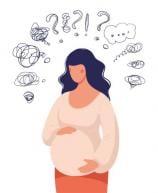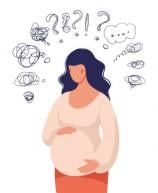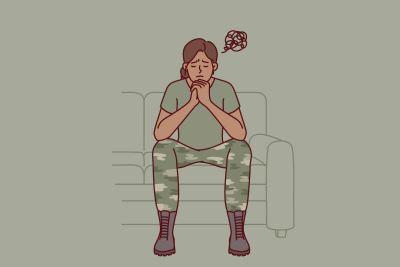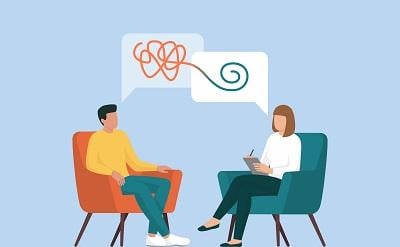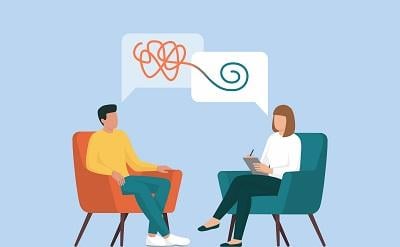Understanding Postpartum OCD and the Mother/Baby Attachment
Understanding Postpartum OCD and the Mother/Baby Attachment

It’s common for a new mother to experience thoughts or worries about her newborn child. I remember the worrying thoughts I had shortly after my son was born when I left for an ADAA conference for a few days. A call from the nanny saying he was sick cut short my trip and I was on the first plane back home. I worried the entire flight. I ruminated about him being sick; I was anxious and I scolded myself for leaving him. But when I saw him and realized that he would be fine, my anxiety subsided.
But what happens when that anxiety doesn’t end? What if a new mother cannot get certain bad thoughts and ideas about or relating to the baby out of her head? What if almost every thought about her newborn is frightening or morbid and she actually fears that either she or someone or something will harm the child? What makes her think these things obsessively and perhaps act compulsively in some way? How can she stop the endless thoughts that she will lose control and hurt the baby or that other people will do something awful to the child?
What are PMADs and Postpartum OCD
Perinatal mood and anxiety disorders (PMADs) are often misunderstood and misdiagnosed. Particularly postpartum Obsessive-Compulsive Disorder (OCD). While more information, support and treatment are sought for perinatal depression – which includes depression in pregnancy and/or through the first year after birth – postpartum OCD is one of the less talked-about, less recognized and less treated PMADs.
Part of the reason why postpartum OCD is less known or diagnosed is because of the nature of the disorder. No one wants to feel or have malicious thoughts about harming or having harm come to their child. Telling someone about such reoccurring thoughts is even harder to do, particularly when motherhood is seen as a time of nurturing, attaching, and caring for this tiny, helpless, precious baby.
The person suffering – who could also be the father but more often the mother - has no control over the symptoms, which include disturbing thoughts and excessive behaviors regarding the baby’s well-being. These thoughts and actions go beyond normal anxiety involved with having a newborn. Postpartum obsessions might include fear of contaminating the baby, dropping the baby, accidentally molesting the child, and extreme feelings of not being a good mother or caregiver. Postpartum compulsions might include repeatedly washing or excessively checking on the baby or avoiding or neglecting the baby.
OCD, Women and Hormones
Studies have shown that women with OCD are likely to have abnormal hormone levels and that these hormones play a role in triggering or worsening the condition. While I abhor derogatory terms towards women and their periods, there is biological reason for the intense and sometimes painful feelings women have before they menstruate. Premenstrual periods are when estrogen levels are highest. OCD symptoms tend to worsen during premenstrual periods, pregnancy, and postpartum.
PMADs affect about 15 to 20 percent of women in the United States, with perinatal depression being the most common disorder, but about 3 to 5 percent of new mothers experience perinatal OCD. This type of OCD may occur during or immediately after giving birth and even within 4 to 6 weeks later.
Treatments for Postpartum OCD
It is imperative at all times to screen for and diagnose postpartum OCD as early as possible by a professional. Mothers should not be afraid to tell someone what they are thinking. Thoughts are just thoughts but when they become obsessive, irrational thoughts and interfere with one’s daily life, they need to be addressed. Early treatment, which can include therapy and medication, is especially important in postpartum OCD as it can prevent neglect and strengthen the mother/baby attachment. Sometimes early identification and diagnoses can prevent any involvement of Child Protective Services or other welfare agencies.
Because postpartum OCD can be difficult to diagnose, it is helpful to ask questions like: Do you have intrusive violent thoughts, images, or impulses involving the baby that are causing tremendous stress? Do you constantly check the baby, wash your hands, or engage in other repetitive behaviors or mental acts that are aimed at reducing anxiety? Questions like these can help shed light on an OCD diagnosis and ensure early intervention.
There are also treatments that can help with hormone levels to alleviate OCD symptoms. Women who have elevated levels of estrogen may consider progesterone therapy to balance high estrogen levels. Growth hormone and pregnenolone (a steroid hormone involved in the sex hormones) can also play a role. Hormone levels would be measured and imbalances would be addressed with hormone replacement therapy using bio-identical formulations that duplicate the body’s natural hormones. Women should contact an endocrinologist, who specializes in hormonal imbalances.

